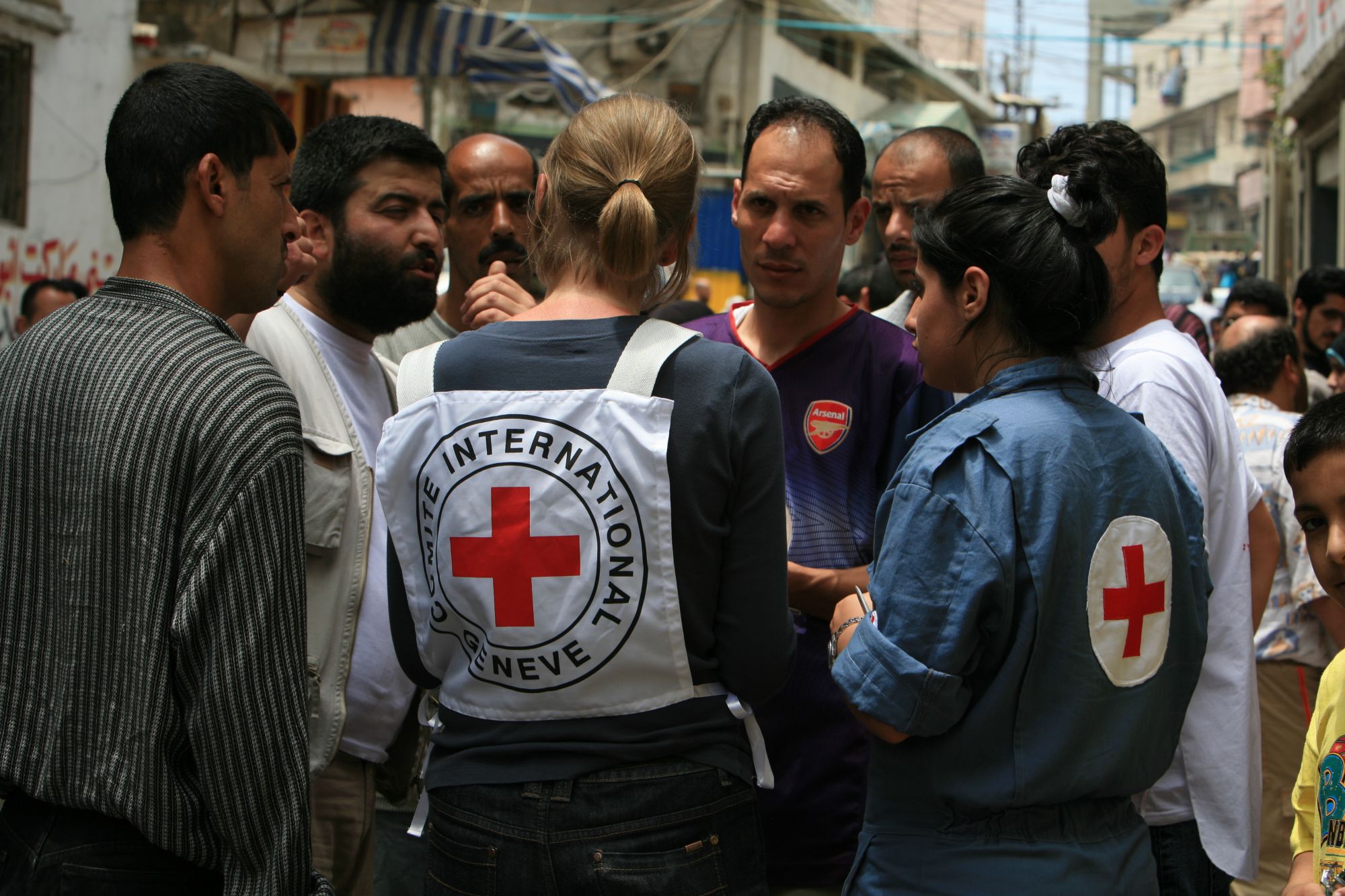
Tripoli, Beddawi camp. Discussion with refugees. Photo: ICRC / Jordi RAICH
Negotiating in the context of a humanitarian emergency is a complex and sensitive exercise. Humanitarian negotiators must constantly juggle the demands of different counterparts, the requests of higher-level managers, the lack of information, a sense of urgency, the contextual threats and uncertainty as well as the challenges dilemmas and stakes for the negotiation itself.
Research has shown that these multiple layers of pressure, when not managed properly, can have a negative impact on the negotiation process and all the people involved. Being able to deal with pressure has become an essential skill not just for the humanitarian workers on the ground, but also for their managers and organisations at large.
To understand more about the tools available to support practitioners, the CCHN spoke with Chamutal Afek Eitam, a humanitarian professional, trainer, researcher, and resilience expert.
 Chamutal has been a humanitarian practitioner for more than twenty years, working in various locations including Kosovo, Eritrea, Sri Lanka, Haiti, and the Democratic Republic of the Congo. Since 2019, she is the Director of Learning and of the Contemplative-Based Resilience Project at the Garrison Institute International, a non-profit training and research organisation focusing on humanitarian staff wellbeing and resilience. She is finalising her doctorate degree in Organisational Learning, Evaluations and Humanitarian Aid.
Chamutal has been a humanitarian practitioner for more than twenty years, working in various locations including Kosovo, Eritrea, Sri Lanka, Haiti, and the Democratic Republic of the Congo. Since 2019, she is the Director of Learning and of the Contemplative-Based Resilience Project at the Garrison Institute International, a non-profit training and research organisation focusing on humanitarian staff wellbeing and resilience. She is finalising her doctorate degree in Organisational Learning, Evaluations and Humanitarian Aid.
Chamutal shared with us some essential tips to prepare for, manage, and recover from high-pressure negotiations while taking care of your wellbeing. Keep reading and click on each header to learn more.
A. Be aware of your state of mind
Acknowledge you are acting under pressure
“As humanitarians, we tend to live in a constant fight-or-flight state even when we are not in danger, and we suffer from self-imposed pressure”, says Chamutal. “It is scientifically demonstrated that this interferes with our ability to think logically.”
The perception of a threat (whether it is real or imagined) activates the sympathetic nervous system and prepares the body to react. While this is a great survival mechanism during peak emergencies, living in a continuous state of alert can be straining and damaging for your body.
Acknowledging that in many cases we self-manifest the state of ‘acting under pressure’ is a crucial first step to manage it. Once you start to intentionally take small breaks to breathe and retune during the day, the practice will become natural, and you will find yourself having more control and choice over your reaction to difficult situations. Just as it happens when training any other muscles, you can train your mind to react knowingly instead of being subject to the body’s automatic, physiological reactions.
Acknowledging and processing inner and outer thoughts and emotional processes is also the very first step in the ‘Awareness, Balance and Connection’ or the ABC of resilience. According to this concept, awareness is the essential condition to balance your behaviours and attitudes, and ultimately to connect with your environment and people.
Come to the negotiation process with a clean slate
“During the peak of an emergency, and while we are well aware of the importance of participation and ownership, humanitarians usually arrive on the ground with a particular plan of action”, says Chamutal. “Yet, as we begin our work, we are confronted with different perspectives or opinions to be considered and addressed, and while this is expected, it slows us down. This is something which might create resistance or pressure for a responsive person with an action-oriented mindset.”
“One of the hardest negotiations processes I had to manage”, says Chamutal, “is the one with the people I was trying to assist”. When the local communities do not agree with the response in place, it may feel like hitting a wall: operations are delayed, everything comes to a halt, and a new plan must be negotiated. This is especially hard to accept by the humanitarian workers, who fear operational delays and additional suffering among the community and as a result may feel helpless in managing the situation.
“Being confronted with the unexpected is hard. You land into an emergency situation with a detailed organisational plan, but you also need to be prepared on a personal level. You need to come into the negotiation process with a clean slate and an open mind.”
“We use all our senses and instincts – including our gut feeling – when negotiating. As we approach our counterparts we communicate verbally and non-verbally. For this to happen, it’s necessary that you are aware of what your mind and body are experiencing and signalling.”
B. Create balance
Let things settle
“Our mind is like a snow globe: you need to let things settle for a moment to be able to see what’s going on inside”, says Chamutal. You cannot reflect clearly if you are constantly feeling shaken.
Make sure you take a quiet moment for yourself, to breathe and reflect on what is happening inside your mind, at the end of each day (or anytime possible). This exercise can be done anywhere – in a car, in your room, in nature – and it only takes a few minutes. Gather your thoughts, reflect on your emotions and make sense of what is happening.
“I learned that it is possible to do this in the most complex contexts. A good friend of mine, Luke Atkinson, was what you would define a tough guy; not the type of person you would expect to care about mental health tips. And yet, he was the one who showed me that we need to take breaks and breath especially when we are on the go. We would drive to some destination, stop along the way – in a forest, by the sea… – and take a moment. There is always some time to do this.”
Breathe
Allowing oxygen into your body activates your parasympathetic nervous system. In other words, breathing eases your muscle tension and calms your body down.
“Here is a good breathing technique I use on the go or when I am short on time. It is a useful tool for achieving a relaxed and clear state of mind rapidly”, says Chamutal.
Sit in a comfortable position and take a few deep breaths. To begin the exercise, count ‘one’ to yourself as you exhale. The next time you exhale, count ‘two’, ‘three’ and so on up to five. If you managed to get to five, start the exercise again. If you lost count or found yourself counting to eight, eleven, twenty…, it means your mind has wandered somewhere else. The moment your brain begins to wander, start counting all over again. It’s a calming exercise that will help you refocus.
(Please note: Throughout this exercise, keep taking deep but natural breaths. The numbers you are counting do not represent the number of seconds you should exhale; they are only a way to keep your mind focused.)
Find the method that works for you
“When we speak of self-care, one immediately thinks about eating well, exercising, meditating… But even when ticking all those boxes, one can still feel unwell”, says Chamutal.
You may not like to go running, to meditate or to do yoga. On the other hand, you may feel your happiest self when you’re working on the ground supporting other people; or again, you may thrive in difficult, high-adrenaline situations. This is part of your personality and it’s never wrong.
“There is no unique definition of self-care. I prefer thinking of inner care. At the end of the day, it comes down to knowing and accepting what works for you and what is the right way for you to facilitate balance into your life”.
C. Develop authentic connections
Make time for yourself in between "realities"
Whatever form it takes, inner care should be ongoing and ideally start before your body begins to feel strained. It is just as important to take care of yourself during times of hardship as it is when you’re on leave or after your mission: you will perform better and be more resilient.
As the end of your mission approaches, make sure to keep an hour or even a day for yourself before arriving home. Use this time to disconnect from your work environment, take stock of what you have experienced before you move on, and acknowledge the change.
“It is a bit cheeky – and please don’t tell my family – but when going on leave, I used to fly back home one or two days earlier without telling anyone”, says Chamutal.
Taking time in between missions is just as important for national staff staying in the country. As you wrap up your work, you are not just changing physical environments; you’re also moving between your professional and private lives and need some time in between to process. Also use this time to decide how and with whom you’ll be sharing your thoughts and feelings.
Rely on the tools and methods developed by experts
Scientists and experts have been researching at the intersection of psychology, sociology, and humanitarian practices for years and can provide effective methods to manage pressure, both in the long term and during peaks.
The Contemplative-Based Resilience (CBR) project is a programme developed by the Garrison Institute’s leading contemplative teachers, social scientists, psychologists and aid workers through interdisciplinary studies. “It’s not about sitting still for long periods and chanting”, explains Chamutal. “It is rather about taking little moments during your day to train your mind and gain control over its responses. Through training, practitioners can improve their wellbeing and develop their physiological and psychological resilience to pressure.”
The Garrison Institute focuses on preventative contemplative practices: in other words, the non-religious cultivation of awareness and other soft skills through research-based body and mind practices. The CBR programme relies on the Awareness-Balance-Connection (ABC) methodology – some of which is described above – to help humanitarian professionals become more resilient to pressure through contemplative education and practices.
You’ve learned some helpful tips to manage pressure at the frontlines.
…What now?
-
Join our next “Prepare for Pressure” workshops (CCHN community members only)
As part of its activities, the CCHN regularly organises workshops to help you prepare for high-pressure negotiations. Join us for the next workshop: you will learn from a criminologist and a professional hostage negotiator about methods to prepare before, remain calm during and recover after pressure. You can look for the next dates and sign up for the English or French versions of the event here.
-
Browse our resources page
Not yet a member of our community? No worries! You can still browse the CCHN website to discover useful links to ‘first aid’ and self-learning resources as well as a list of professional coaches with extensive experience working in the humanitarian sector
-
Join the CCHN Community to get access to a range of activities
The humanitarian practitioners who complete one of our Peer Workshops become part of the CCHN community, a global network of frontline humanitarian negotiators brought together by their negotiation expertise and desire to support colleagues across the sector. The members of our community get access to a wide range of negotiation and capacity-building activities, but also workshops and programmes focusing on pressure management, self-care, and resilience in high-stake negotiations like the ones mentioned above. Sign up for one of our upcoming free workshops and become a member!
